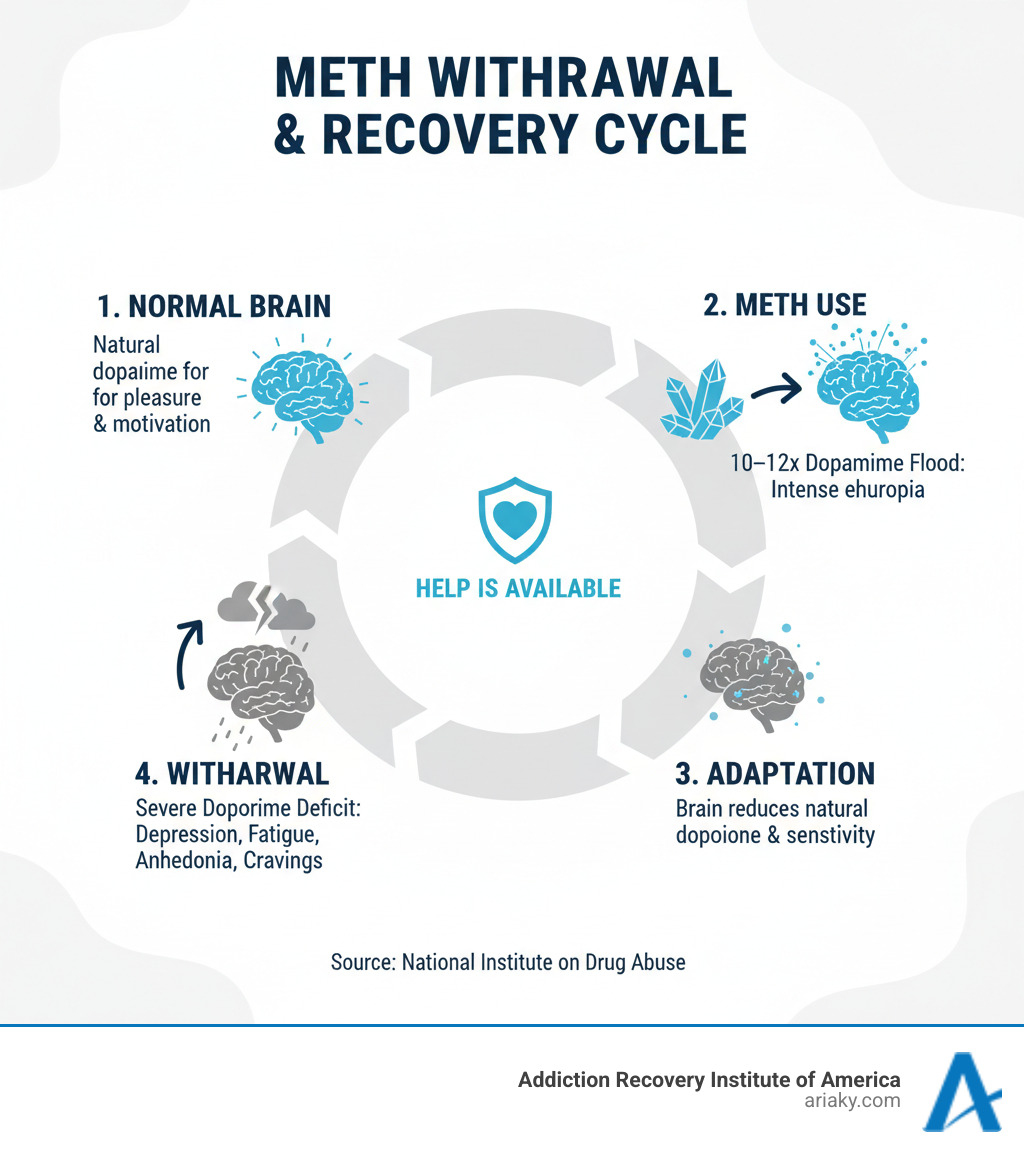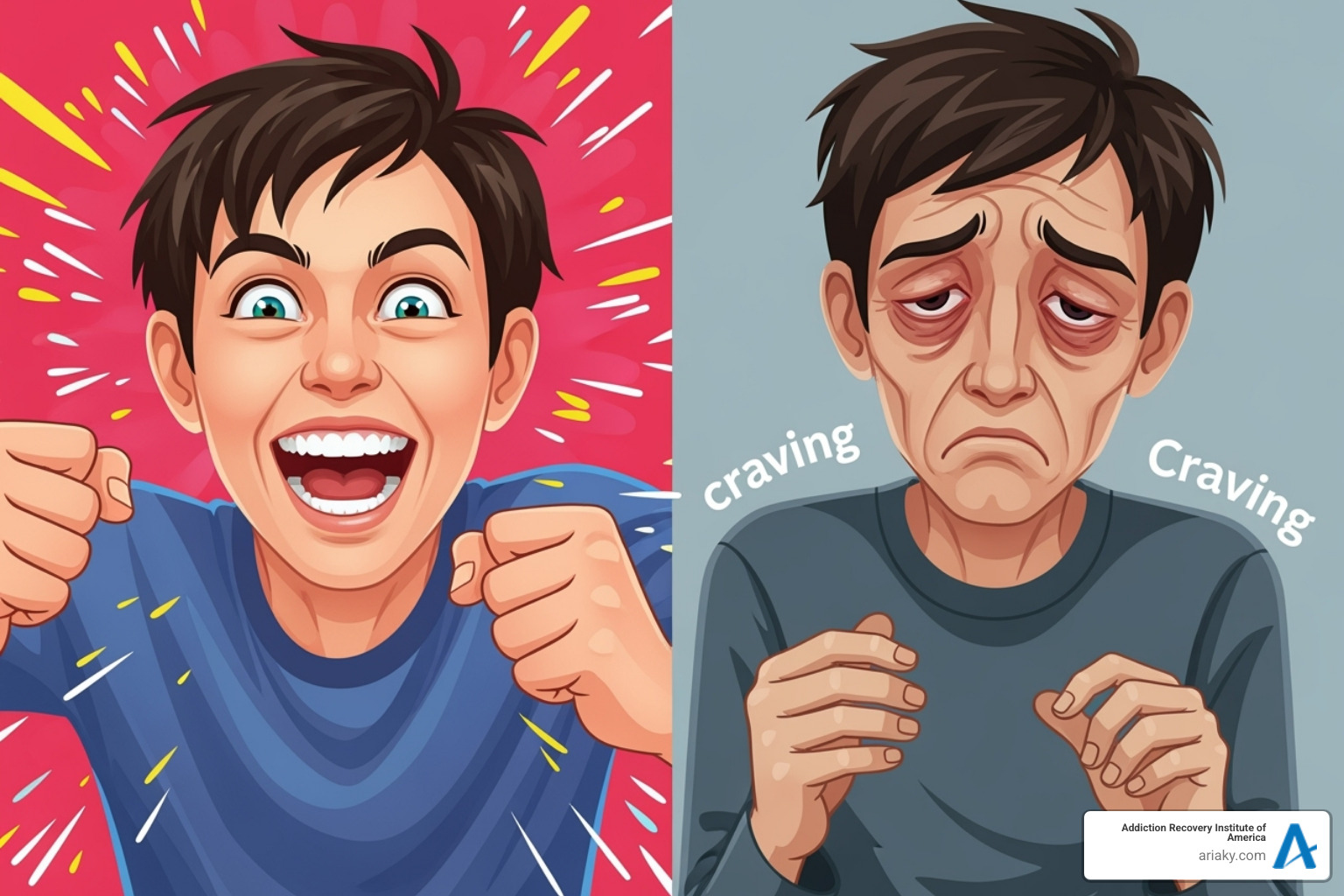Why Getting Help for Meth Withdrawal Changes Everything
Meth withdrawal help is available through medically supervised detox, behavioral therapies like Cognitive-Behavioral Therapy (CBT), and ongoing support systems. Professional treatment addresses both physical and psychological challenges, significantly reducing relapse risk and offering the safest path through withdrawal.
Quick Guide to Getting Meth Withdrawal Help:
- Medical Detox: 24/7 monitoring in a safe facility to manage withdrawal symptoms
- Timeline: Acute symptoms typically last 7-10 days, with some effects persisting for weeks
- Therapy Options: CBT, Contingency Management, and group counseling
- Medication Support: While no FDA-approved meds exist specifically for meth addiction, doctors can prescribe medications to ease depression, anxiety, and sleep issues
- Aftercare: Support groups, outpatient programs, and relapse prevention planning
Quitting methamphetamine is incredibly difficult because of how it hijacks the brain’s dopamine system. Stopping use leads to intense cravings, crushing fatigue, and deep depression.
The good news? You don’t have to face this alone.
With proper medical supervision, people overcome meth addiction every day. While uncomfortable, the withdrawal process is manageable and rarely life-threatening when handled by professionals.
This guide explains the meth withdrawal process, why professional help is crucial, and how to find the support you need for lasting recovery.

Understanding Meth Withdrawal: Symptoms and Timeline
Methamphetamine, a powerful stimulant, floods the brain with dopamine—the chemical controlling pleasure and motivation. Over time, the brain adapts by producing less dopamine and reducing its receptors, leading to physical dependence. This means your body needs the drug to feel normal. This is different from addiction, which is the compulsive use despite negative consequences.
The “binge and crash” cycle is a common pattern where withdrawal begins. After using meth repeatedly, the user “crashes” when the drug wears off, feeling exhausted and depressed. This is the start of withdrawal, which typically begins within 24 hours of the last dose.
Immediate Physical and Emotional Symptoms
Meth withdrawal symptoms are often the opposite of the drug’s effects: crushing fatigue replaces energy, and deep depression replaces euphoria.
- Physical Symptoms: Expect extreme fatigue, a sharp increase in appetite, dehydration, and flu-like symptoms such as muscle aches, headaches, and chills.
- Psychological Symptoms: The emotional toll is often the hardest part. Intense cravings are constant and overwhelming. Profound depression and anhedonia (the inability to feel pleasure) are common. You may also experience severe anxiety, irritability, agitation, and paranoia. Cognitive functions like concentration and memory become foggy. For some, depression can lead to suicidal thoughts, a critical risk that underscores the need for professional support.
These symptoms are your brain trying to rebalance itself, which is why professional meth withdrawal help is so vital. For more information about our drug detox programs in Kentucky, including those for methamphetamine withdrawal, we encourage you to explore our services. More info about our drug detox programs in Kentucky.
The Typical Withdrawal Timeline
While the experience varies, most people go through similar phases.

- The “Crash” Phase (First 24-72 Hours): This phase is marked by extreme exhaustion, with many people sleeping for days. When awake, you’ll face intense cravings, severe depression, and a dramatically increased appetite.
- The Acute Phase (Days 1-10): Acute symptoms peak during this time, lasting up to two weeks. Cravings, depression, anxiety, and agitation remain powerful. Sleep is often disturbed with either insomnia or hypersomnia and vivid dreams. This is the most difficult phase psychologically, with the highest risk of relapse.
- The Protracted Phase (Weeks 2-4 and Beyond): Also known as Post-Acute Withdrawal Syndrome (PAWS), this phase involves milder, lingering symptoms that can last for weeks or months. These symptoms, including depression, anhedonia, cravings, mood swings, and fatigue, often come in waves.
Physical symptoms usually resolve in weeks, but psychological healing takes longer as the brain’s dopamine system recovers. While meth withdrawal is rarely medically life-threatening, the psychological distress makes professional meth withdrawal help essential for safety.
The Dangers of Detoxing Alone & The Benefits of Professional Help
Trying to quit meth on your own is incredibly difficult. The psychological distress is overwhelming, as your brain screams for the dopamine it’s missing. This leads to severe depression and an inability to feel pleasure, making the urge to relapse feel overpowering.
Many people using meth also have co-occurring mental health disorders like depression or anxiety, which can worsen during withdrawal. Detoxing alone means facing this vulnerable period without a safety net, a risk no one should take.
Key Risks and Complications of Meth Withdrawal
While not typically causing seizures like alcohol withdrawal, meth withdrawal has serious psychological dangers.
- Severe Depression and Suicidal Thoughts: The drop in dopamine can cause overwhelming despair and a significantly increased risk of self-harm, especially for chronic users.
- Meth-Induced Psychosis: Long-term use can trigger paranoia, hallucinations, and psychotic episodes that may persist or worsen during withdrawal.
- Dehydration and Malnutrition: Neglecting self-care during addiction leaves the body depleted. Without proper nutrition and hydration during withdrawal, serious medical complications can arise.
- Relapse: The combination of intense cravings and profound discomfort makes relapse extremely likely without a structured, supportive environment.
Why a Medically Supervised Detox is the Safest Choice
Professional meth withdrawal help in a detox facility provides safety, support, and a foundation for success.
- 24/7 Medical Monitoring: Healthcare professionals watch your vital signs and mental state, ready to intervene if complications arise.
- Safe, Structured Environment: A trigger-free setting allows you to focus solely on recovery without temptations.
- Symptom Management: While no specific medication cures meth addiction, staff can prescribe medications to ease anxiety, insomnia, depression, and agitation, making withdrawal more tolerable.
- Emotional Support: Compassionate staff offer counseling and evidence-based strategies to manage cravings and depression.
- Reduced Relapse Risk: By managing symptoms in a safe, supportive environment, the likelihood of relapse is drastically reduced.
- Transition to Further Care: Detox is the first step. A quality program connects you to the next level of care, such as residential or outpatient treatment, which is essential for long-term sobriety.
At ARIA Kentucky, our medically supervised detox programs offer a safe environment for this critical phase. More info about our residential care options.
Comprehensive Meth Withdrawal Help: Treatment and Medications
Lasting recovery from meth addiction requires a comprehensive approach that addresses your physical, mental, and emotional health. Effective meth withdrawal help extends beyond the initial detox phase. At ARIA Kentucky, we integrate medical support with proven behavioral therapies to provide the tools needed for a life in recovery.
Are There Medications to Ease Meth Withdrawal?
Currently, there are no FDA-approved medications specifically for treating methamphetamine addiction. Unlike opioid addiction, there is no equivalent to methadone or buprenorphine for meth.
However, medical professionals can prescribe medications to manage specific symptoms and make withdrawal safer and more tolerable:
- Antidepressants (like bupropion) can help stabilize mood and combat the severe depression of withdrawal.
- Anti-anxiety medications and sleep aids may be used cautiously for short periods to manage agitation and insomnia.
- Antipsychotic medications can be prescribed to control meth-induced psychosis or severe paranoia.
Researchers continue to investigate promising new treatments, but for now, medication is used as a supportive element within a comprehensive, medically supervised plan.
Evidence-Based Behavioral Therapies for Recovery
Behavioral therapy is the foundation of lasting recovery, as it addresses the psychological roots of addiction.
- Cognitive-Behavioral Therapy (CBT): This therapy helps you identify and change negative thought patterns and behaviors related to drug use. You’ll learn practical skills to recognize triggers and cope with them effectively.
- Contingency Management (CM): This incentive-based approach provides tangible rewards (like vouchers) for positive behaviors, such as negative drug tests. It helps retrain the brain’s reward system to find satisfaction in healthy choices.
- Individual and Group Therapy: Individual counseling provides a private space to address underlying issues like trauma. Group therapy offers connection and support from peers who understand the struggle, reducing feelings of isolation.
- The Matrix Model: This comprehensive, structured program combines various therapies, education, and 12-step support, specifically for stimulant users. It provides the structure and accountability needed for a stable recovery.
These therapies work together to build a strong foundation for a future free from drugs. At ARIA Kentucky, we tailor these approaches to your unique needs. More info about addiction therapy in Kentucky.
Building a Support System and Life in Recovery
Recovery doesn’t end after detox; it’s a long-term process. Meth withdrawal help is the first step. Your brain needs months, sometimes years, to heal its dopamine system. During this time, you may experience waves of depression or cravings. This is why ongoing support is not about willpower—it’s about giving your brain the time and structure it needs to rebuild.
A solid relapse prevention plan is your roadmap, identifying triggers and strategies for managing cravings. Aftercare, such as outpatient therapy or support groups, is essential for staying anchored in recovery.
How Friends and Family Can Provide Support
If your loved one is in recovery, your support is vital. Here’s how you can help:
- Educate Yourself: Understand that addiction is a medical condition to respond with compassion.
- Offer Encouragement: Acknowledge their effort and celebrate small victories.
- Create a Safe Environment: Remove triggers and establish a calm, supportive home.
- Listen Without Judgment: Allow them to talk about their struggles without criticism.
- Set Healthy Boundaries: Protect your own well-being. You can be supportive without enabling destructive behavior.
- Support Professional Care: Help with logistics like driving to appointments.
- Practice Self-Care: You can’t pour from an empty cup. Seek support for yourself, too.
- Be Patient: Brain healing takes time. Consistent, long-term support is key.
Long-Term Outlook: Is Full Recovery Possible?
Yes, full recovery from meth addiction is absolutely possible. Recovery isn’t about returning to who you were; it’s about becoming a stronger, more self-aware person.
Think of addiction as a chronic condition that can be successfully managed with ongoing attention. The brain has a remarkable capacity to heal. With sustained abstinence, dopamine receptors recover, and cognitive functions improve. Physical and mental health improve dramatically with healthy habits like proper nutrition, exercise, and sleep.
Relationships can be rebuilt, and life goals like education and career advancement become possible again. Peer support groups like Narcotics Anonymous or SMART Recovery provide an invaluable sense of community and accountability.
At ARIA Kentucky, we equip people for a lifetime of recovery, from detox to aftercare. More info about the continuum of care model.

Recovery is happening right now for thousands of people. You can be one of them.
Frequently Asked Questions about Meth Withdrawal
Here are answers to some common questions about meth withdrawal help.
Can using methamphetamine just once lead to withdrawal symptoms?
No, using meth once is highly unlikely to cause withdrawal. These symptoms occur after chronic, repeated use leads to physical dependence. However, even a single use is dangerous and carries risks like overdose, acute psychosis, and starting a pattern of addiction.
How long does the depression from meth withdrawal last?
This varies greatly. Severe depression is common during the acute phase (the first 7-10 days). For many, these feelings of sadness and anhedonia (inability to feel pleasure) can linger for weeks or even months as the brain’s dopamine system slowly heals. This prolonged struggle is why ongoing professional support, including therapy and sometimes medication, is essential for managing symptoms and preventing relapse.
What is the first step to getting meth withdrawal help?
The first and most courageous step is acknowledging you need help. After that, the next action is to reach out.
You can call a national helpline like SAMHSA’s National Helpline (1-800-662-4357) or contact an addiction treatment center directly. A professional assessment at a center like ARIA Kentucky will determine the right level of care for you, whether it’s medical detox, residential treatment, or an outpatient program. Taking that first step to make a call is an act of strength that starts you on the path to recovery.
Conclusion: Your Path to Recovery Starts Today
Seeking information is the first step toward change. You now understand how meth affects the brain, what to expect from withdrawal, and why trying to detox alone is so dangerous due to severe depression and cravings.
The better way is professional meth withdrawal help. Medically supervised detox provides safety, symptom management, and compassionate care. Beyond detox, evidence-based therapies like CBT provide the tools to rebuild your life. Recovery is not just about getting through withdrawal; it’s about building a life you want to live.
Recovery is absolutely possible. At ARIA Kentucky, our accredited, AODE-certified programs are built to help you succeed. We offer a full continuum of care—from detox to outpatient programs—custom to your unique journey. With locations across Kentucky and in West Palm Beach, we are ready to help.
Making the first call is often the hardest part, but our team is here to support you. You don’t have to do this alone.
Find out more about our Kentucky meth detox program.
You deserve a life free from meth. Let’s start building it today.


